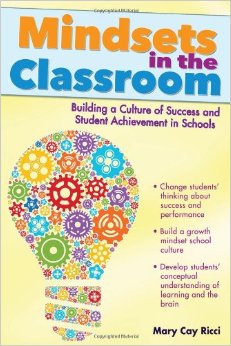MINDSETS IN THE CLASSROOM
When students believe that dedication and hard work can change their performance in school, they grow to become resilient, successful students. As educators of Jordan School District we want to make sure that we have a growth mindset and believe in “ Every Child, Every Day”.
Each month we will post ideas from the book , Mindsets in the Classroom, 2013 by Marcy Cay Ricci, that provides educators with ideas for ways to build a growth mindset school culture, wherein students are challenged to change their thinking about their abilities and potentials.
Chapter 1 begins by supporting the idea that intelligence is malleable. Dr. Carol Dweck, in her 2006 book , Mindset, The Psychology of Success describes a belief system that learners with a growth mindset believe that they can learn just about anything. It might take more time and effort, but they will get it. An educator with a growth mindset believes that with effort and hard work from the learner, all students can demonstrate significant growth and all students deserve opportunities for challenges.
| Growth Mindset | Fixed Mindset |
| A belief system that suggests that one’s intelligence can be grown or developed with persistence, effort, and a focus on learning |
A belief system that suggests a person has a predetermined amount of intelligence, skills or talents
|
Do you believe that intelligence is something you are born with? Do you believe that it cannot be changed?
Dweck presents the idea that students in a fixed mindset is problematic at both ends of the continuum. For those students who struggle or do not perceive themselves as smart, it becomes a self-fulling prophecy. Because they don’t really believe they can be successful and will often give up and not put forth the effort. For those students who are advanced learners become consumed by “looking smart” at all costs. They may have coasted through school without really putting forth much effort, yet they are often praised for their good grades and strong skills. Often students with a fixed mindset will start avoiding situations where they may fail;they can become” risk adverse” or blames outside forces when failure occurs.
Please check back next month and we will look at Chapter 2, "What are some ways to begin building a growth mindset culture"
